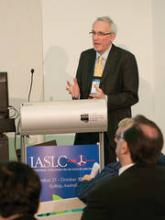SYDNEY, AUSTRALIA – Video-assisted thoracoscopic partial pleurectomy significantly improved quality of life and control of pleural effusion compared with talc pleurodesis in patients with malignant mesothelioma in a randomized, controlled, multicenter trial.
However, pleurectomy did not increase overall survival in the study, based on data presented in a plenary session at a world conference on lung cancer.
"The problem we now have is, we’ve got a negative result and a positive result because of the primary endpoint, so detractors could say there’s a negative endpoint so there’s no role for surgery," lead researcher Dr. Robert Rintoul said in an interview at the meeting, which was sponsored by the International Association for the Study of Lung Cancer.
The MesoVATS trial is an open-label, parallel-group, multicenter trial that included 175 patients with malignant pleural mesothelioma and pleural effusion. Patients were randomized to either partial pleurectomy (n = 87) or talc pleurodesis with slurry or poudrage (n = 88).
At 1 year, survival rates were 57% in patients who received talc pleurodesis and 52% in those randomized to pleurectomy (hazard ratio, 1.03; 95% confidence interval, 0.76-1.42; P = .83).
In the secondary outcome measures, however, pleural effusion was controlled at 1 month in 37% of patients in the talc group and in 59% of patients in the pleurectomy group (P = .008). At 6 months, pleural effusion was controlled in 57% of talc and 76% of pleurectomy patients (P = .04). Control of pleural effusion did not significantly differ at 9 and 12 months.
The EQ-5D quality-of-life measure was significantly improved with pleurectomy versus talc at 6 months (mean difference, 0.08 [95% CI, 0.003-0.16; P = .042]). Quality of life at 12 months also was significantly better with pleurectomy, but this finding became nonsignificant after adjustment for bias due to missing data.
Median hospital stay was significantly longer in the pleurectomy group (8 vs. 6 days; P < .001), and complications such as prolonged air leak were seen in 26% of those in the surgery arm and 8% of the talc arm (P = .009). The groups did not differ significantly in the incidence of serious adverse events.
Previous, nonrandomized research had suggested that pleurectomy may be associated with increased survival and better control of pleural effusion.
While the study failed to find a significant effect of surgery on the primary endpoint of survival at 12 months, the improvements in quality of life were particularly relevant for patients with malignant mesothelioma, said Dr. Rintoul, consultant respiratory physician at Papworth Hospital, Cambridge, England. "Quality of life in those last 12-13 months of life is very important, and [surgery] is something that is fairly well tolerated and doesn’t require a lot longer hospital stay."
Although the surgical procedure was more expensive than talc pleurodesis, Dr. Rintoul said it was worth giving patients the choice.
No relevant conflicts of interest were declared.


